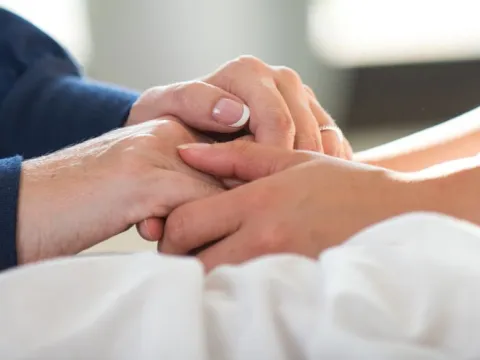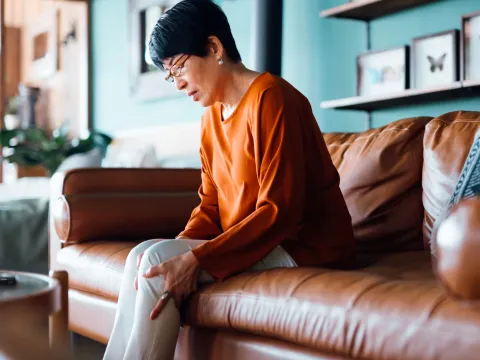- AdventHealth

Richard Belanger, now 51, of Orlando, was fulfilling a lifelong dream when he enrolled in the Orange County Sheriffs Office Academy in January 2014.
After receiving a clean bill of health, the former US Marine and executive chef had just passed the Academy's physical fitness test (back-to-back runs, sit-ups and push-ups) when he couldn't catch his breath, became dizzy and blacked out.
When I came to, I was being cared for by EMTs and they told me Id had a heart attack, recalls Richard. Next thing I knew, we were on our way to the hospital.
In the ambulance, Richard was laughing and joking when he went into cardiac arrest a second time and his heart stopped beating. EMTs shocked him and brought him back to life before arriving at AdventHealth Orlando's emergency department.
When his wife, Charlene, arrived at the hospital, she didn't know whether she'd see her husband alive again. As the medical team rushed him to treatment, she leaned over and whispered to Richard during the chaos: You better not leave me!
A Team Ready and Waiting
As soon as Richard arrived, Chin Kim, MD, an interventional cardiologist with the AdventHealth Cardiovascular Institute, escorted him to the heart catheterization lab. Dr. Kim is part of the Code STEMI (ST-Segment Elevation Myocardial Infarction) team, a joint program between the emergency and cardiology departments. Code STEMI allows quick diagnosis and treatment for patients who have had a heart attack. Care is provided within minutes of arriving at the hospital.
If a heart attack is suspected, an electrocardiogram (EKG or ECG) is performed immediately to detect signs of poor blood flow, heart muscle damage, abnormal heartbeats and other heart problems.
Once a heart attack is diagnosed, the Code STEMI is activated, with a cardiologist and a trained cardiac catheterization team at the ready to provide emergency treatment such as primary angioplasty, thrombolytic therapy or even emergency bypass surgery.
Taking Steps to Save Richard
During transport, Richards' heart stopped for a third time and the team quickly went into action.
Richards left main artery, which supplies 80 percent of blood flow to the heart, was completely blocked and required a stent, Dr. Kim says. During the procedure, his heart wasn't beating by itself and the team worked feverishly to resuscitate him. Once the stent was in place, Richards' heart began beating but he was unconscious and was placed on a ventilator to breathe. To preserve brain function and his vital organs, the team rapidly cooled his body temperature. Cooling patients after cardiac arrest helps control the extent of injury to the brain and decreases the amount of damage to the heart.
Studies have shown that patients who receive this type of treatment have better outcomes and decreased mortality.
The treatment at AdventHealth is performed with Medivance's Arctic Sun, a machine that uses temperature-controlled, water-filled pads attached directly to the patient's skin, allowing doctors and nurses to cool body temperatures down to between 32 and 34 degrees Celsius (89.6 and 93.2 degrees Fahrenheit), inducing mild hypothermia.
Patients who come into the hospital with certain types of cardiac arrest, who are on a ventilator or who are unconscious are cooled as soon as possible for 24 hours before their body temperature is steadily increased. Typically, it takes eight to 12 hours to rewarm the patient.
Richard regained consciousness the next day, surprising everyone who had seen him the day before.
Richard's Recovery
Within a few weeks, he began rehabilitation as part of his recovery. He first met with Carol Humes, lead cardiac nurse, to be assessed, and was monitored closely while slowly building his physical endurance.
We spend a lot of time with patients during an assessment to determine their goals, explains Carol. We help them reach them as safely and quickly as possible.
Though Richard has a long road ahead, he's optimistic he'll be able to pursue his dream of becoming a sheriffs deputy.
My hearts recovered, he says, and the experience has made me re-evaluate many things and make lifestyle changes. Things are a lot clearer for me.
This story was originally featured in the Summer 2015 issue of Best in Care.



